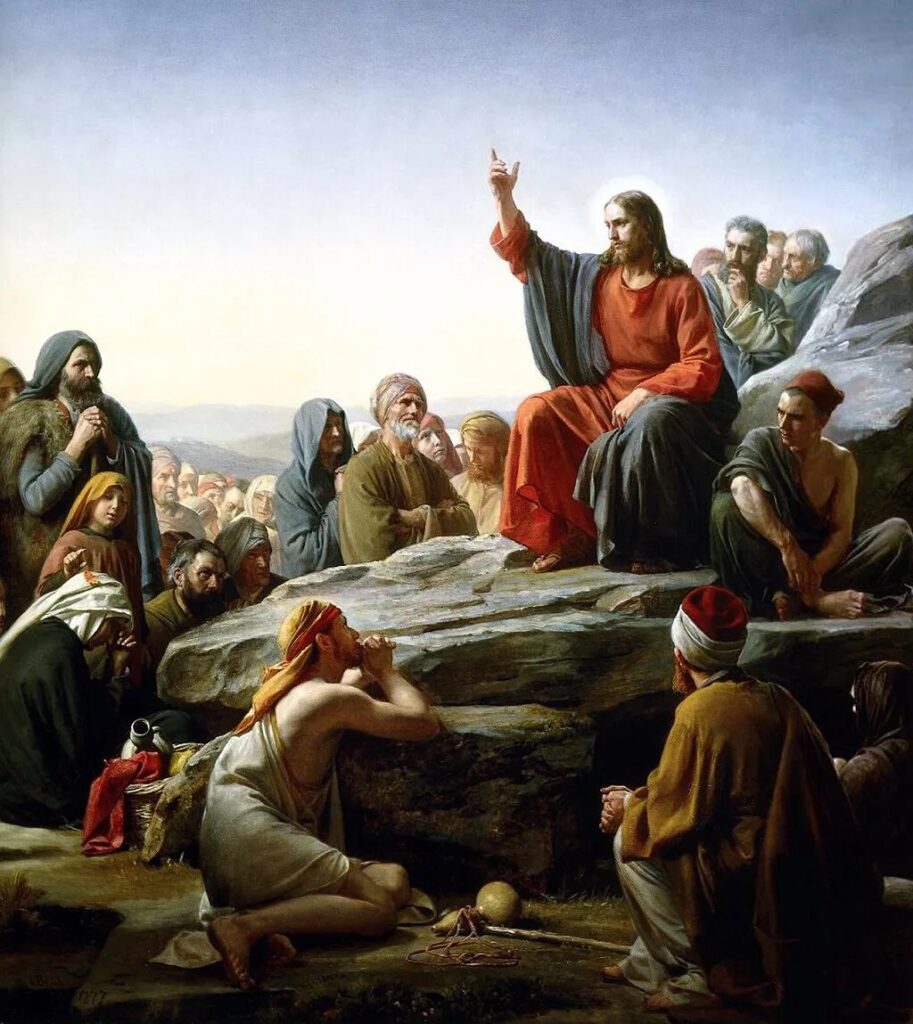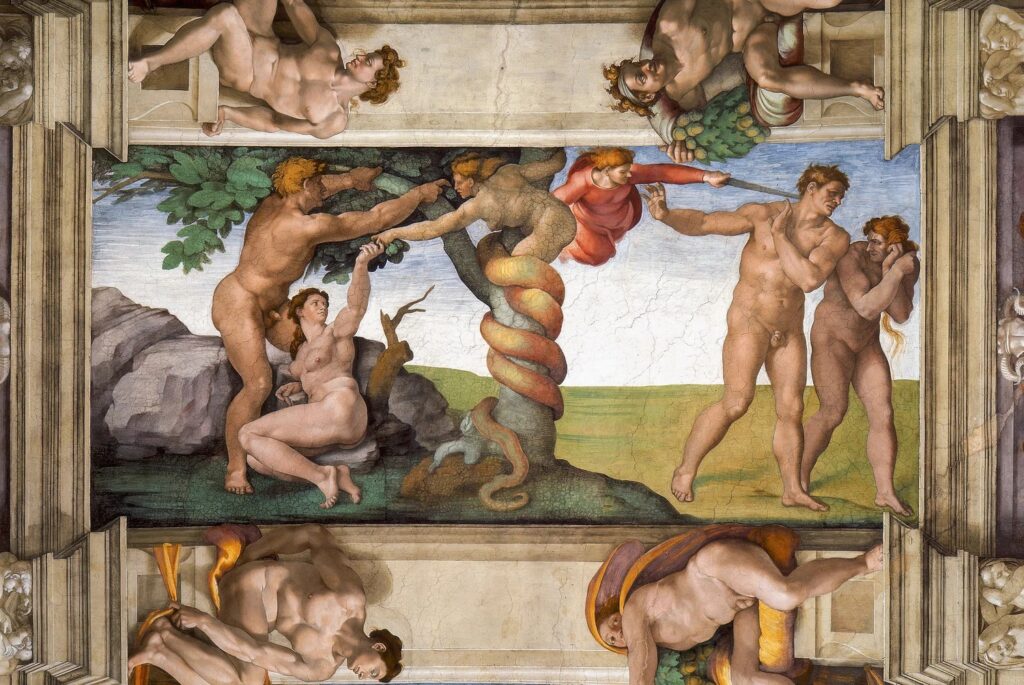Renaissance Ministries – The Foundation
 The Foundation of the Renaissance Ministries: Jesus Christ as the Embodiment of Truth
The Foundation of the Renaissance Ministries: Jesus Christ as the Embodiment of Truth
by Thomas Lee Abshier, ND
3/24/2025
Renaissance Ministries: Back to the Garden:
As humanity chooses to follow God’s way, the Kingdom of Heaven joy arises in our hearts and manifests in our lives. In the beginning, God and man walked together in the Garden. When we followed our desires and chose the sweet taste of satisfying the flesh and rebellion against God’s way, our eyes were opened to the pleasures of sin.
We had no experience or wisdom to guide us in distinguishing good from evil, and mankind succumbed to the seduction of bodily hunger. We unknowingly served other gods whose food and pleasure were our pain, degradation, and death. Our souls were bound in allegiance to demons as we contracted with the spirits of evil. We traded our life, health, and freedom to fill a desire.
The terms of our contract with evil were death, pain, and bondage for a moment of unGodly pleasure. Sooner or later, the contract required eventual death. As the decay proceeded, our bodies degraded, and we adopted the values of our demonic lords. Our souls and spirits were exiled from the pure and joyous fellowship with the Most High.
The price of sin is death. it is not God who kills and tortures those who sin. Rather, His creation, the structure of life, and the terms of His Law invariably, dependably, and justly administer the consequences for violating His Law. We have free will, and the terms of violating His Law allow the demonic realm to take ownership of and bring death to all who sin.
He created Satan and the demonic realm with a taste/drive/desire/lust for blood, suffering, and bondage. The demons derive as much pleasure and energy from unrighteous death as a man receives from food, air, sex, money, power, and fame. God desires love, peace, joy, life, health, and freedom for man. The demonic tastes and desires are the mirror opposite of God’s character, morals, and values.
God created the demonic realm and populated it with spirits that love lies, murder, infidelity, and theft as much as He loves life and His Law/Will/Way. He created hell, a kingdom that opposes everything He values, giving man a choice of who to love and serve.
He gave demons the ability to speak to the mind/heart of man and stimulate his passions, desire, and love for the unGodly/unlawful/unholy. He gave demons the ability to tempt man into violating His will/way/Law. He gave demons the ability to feel pleasure in the degradation of man’s health, relationships, wealth, happiness, and life. The demonic spirit is motivated to seduce a man into violating God’s way. The demon who succeeds in luring a man into sin is given the soul and life of the man who tastes and eats the fruit of temptation.
God (the Word/the Son/the Creator of all) created the demons to test the character of every man. In the demons, God created another lover, a temptress who serves as a worthy adversary in the battle for man’s affection, love, loyalty, and service. God Gives good gifts in return for loving Him and His Law. The demons give pleasure for a moment and take life, soul, and freedom in payment. In taking a man’s soul and life and degrading his function, the demons fulfill their hunger for death, misery, and bondage. He gave demons the right to own the soul of the man who violates His Way, extract his life, and derive succor from his pain and decay.
God created man innocent but with the tastes/desires and hungers of an animal. The play of life is the drama of man growing his soul, maturing it to either worship and love God and His way or follow the broad path of feeding his animal hunger. In loving God’s Law/Will/Way, we express our love for God, and at least on earth, while we cannot see Him, He is satisfied by the offering of our obedience and perceives it as love.
The universe is a garden, a training ground, a testing field. We have the authority and freedom/autonomy to choose our soul’s character. We choose repeatedly and gradually harden our souls. We turn whims, thrills, and experimentation into character through repeated choices. We can choose Heaven or Hell, God or Satan, flesh/sin/self or Godliness. We can choose how we nourish and grow our flesh, soul, and spiritual character.
God created man with a taste for sin, a hunger for eating too much, too often, and from the plate of others. God created man with a weakness and desire for and susceptibility to the unGodly. The unholy/unGodly appeals to the flesh, ego, and animal nature. Feeding this hunger results in death, disease, poverty, and unhappiness. The naive see only a humorless, controlling, capricious, and unkind God who created a senseless universe to satisfy His desire for sadistic voyeurism.
The Bible, seen in another frame, reveals a loving God who values free will as a primary pillar of society. It illustrates relationships governed by His Law/Will/Way that truly fill man’s heart and satisfy his soul hunger and flesh desires.
God created the universe out of nothing. He is self-existent. His existence is an unfathomable mystery. No human concept can justify, rationalize, or imagine the existence of existence without a precursor or cause. The sequence and method of creating the creation cannot be explained. We must accept existence axiomatically.
I urge consideration of the postulate of God’s existence as the source of the universe in which we live. I propose testing this postulate by comparing the consistency of the Bible with Science and the hypothesis that the purpose of life is to satisfy God’s desire for love.
I postulate that He created the demons as advocates for all values, acts, purposes, and emotions that oppose His way of being. He created the kingdoms of Heaven and hell to allow man to choose his character and lover.
As man violated the terms of His Law, he showed himself loyal to and lover of evil, demons, Satan, and hell. The results of worshipping, servicing, and sacrificing to other gods with our lives and actions are predictably bad, painful, and deadly. The price will eventually be paid even if the debt collection is delayed.
The cost of serving the demonic is unavoidable and high. The terms of the demonic contract are unbreakable. They are backed by and integral with God’s Law. The contract with the demonic will be fulfilled. Death follows sin, and the degradation between sin and death is the slow sucking of life from man to energize Satan and empower Satanic miracles (the smiracles). Satan owns the soul and spirit of every man who has ever sinned, even once. It’s the Law and the way God designed and created the universe.
The murder of Jesus Christ was unjust, unwarranted, and illegal. The demons violated the terms of the Law, which they must obey. They killed a man who was perfect, sinless, without warrant justifying taking His life. The demons tempted spoke to the minds of men susceptible to their voice.
The demons spoke into the heart of the Pharisees, the spiritually blind men who plotted to kill Jesus Christ. These were men who could not prioritize God’s Law rightly. They gave greater importance to a traditional (but wrongly understood) interpretation of God’s Command to keep the Sabbath holy rather than healing the sick by the power of God.
Possibly, these men were threatened by the loss of power if the prophesized Messiah were incarnated. Perhaps they were blinded by tradition and the teaching/interpretations of men. Regardless, Satan used these men who were susceptible to the tempting voice of demons to kill the Messiah to prevent His rule/reign and destruction of their kingdom.
The demons seduced men to crucify Him. Jesus was tortured, beaten, and hung on the cross until He was dead. In so doing, the final piece of the creation was put in place.
As He died, Jesus said, “It is finished.” God, the Father and Son, had engineered the construction of a living system. They created a world where we have a meaningful and free choice between Heaven and Hell; we can choose to love God or Satan and follow the way of one or the other. We can choose the way of demons, feed the flesh like animals, and remain hungry. Or we can choose to moderate our diet of sex, money, and power according to God’s Law/Will/Way and continually use the options of the flesh according to His Way and sustainably, intermittently, and in proper time to satisfy both the heart of God and man.
Unrighteous and sinful men/pawns of Satan murdered the incarnated Son of God. But death could not lawfully hold Him. The Father raised Him from death. He arose victorious, having never violated divine Law. Jesus Christ never sinned; He never made a contract with the demons to trade His life for pleasure. Nevertheless, the demons tempted men to murder Him. They had no legal warrant. God had not authorized them to take the life of Jesus. Thus, having killed Him, without a contract on His soul justified by sin, He could not be held in death and hell. Thus, He descended and set the captives free.
Jesus Christ’s death was a credit in His account. He paid the debt of death, but he had no debt to pay. That credit can never be used. He has passed from incarnated life to Heaven, and His death remains a credit on His account to pay for His sin. Thus, the credit of His death is available for us to claim. We can use the credit of His death to pay the debt of death we owe. Our sin justifies our debt and its payment by our death.
We can claim that credit when we have made a heartfelt/sincere commitment to living a Godly/perfect/Holy Spirit-led life. Jesus’s life, the perfection of His being, is the standard by which all life is measured. He is the source and pattern of perfection. When we accept Jesus as Lord, we have declared Him our master and only guide for our lives. In accepting Jesus as Lord, we have accepted Jesus as Savior.
The debt to the demons is paid when we accept Jesus as our Lord and accept His death as payment for a contract with Satan. Such a commitment may not be explicitly understood or unarticulated, but God will accept our childlike understanding and commitment to be like Him.
With our committed allegiance to Godliness as patterned by Jesus’s life and spirit and our acceptance of the validity/value of His sacrifice, we have accepted payment of our debt. In so doing, we have freed ourselves from the demonic contract. We are paid in full. The contract we made with Satan and his demons is fulfilled.
We can choose to return to the Garden, and we will if we are diligent in cleansing our souls. We must be reborn in a new spirit. We do so by our commitment and listening to the Holy Spirit speak. As we read the Bible, we are instructed by physical/earth-level words that give access and authorization to the Holy Spirit’s guidance in our life choices.
As we live in allegiance to God speaking through His Holy Spirit, we grow in Godly character. It is our will, concession, and direction of the flesh to act out His Way on earth that imprints character, teaches others, and embodies the worlds, thoughts, and acts of living in the Kingdom. Through the vehicles of our bodies, minds, and words, we can live according to God’s will and way.
Living according to God’s principles and cultivating Godly character is the central challenge of life. Recognizing the existence of both good and evil brought confusion, but by correctly identifying goodness, God’s way of being, and rejecting the temptation of evil, life is made simple and direct. Life directed by God’s principles will enlist the help of angels and Heavenly hosts to coordinate life events. As the nation/world is sanctified by habitual, legislated, socially taught, and reinforced obedience to His Way, the context of life is cleansed. The destructive impulses, plans, and purposes of the demonic are resisted. As we choose Godliness and resist the demonic temptations, we will find that we are recreating/reenacting/returning to life in the Garden. The Kingdom of God is within, and God desires that man live according to His Law/Will/Way. In doing this, we will manifest the Lord’s prayer and live on Earth as it is in Heaven.
Renaissance Ministries is committed to examining every question asked and resolving philosophical questions to create a seamless fabric of logic within which to place every observation and consideration of life. In Truth, there is no fear. There are no taboo subjects, no questions suppressed, no conspiracy theories unexamined, and no subject too politically incorrect to investigate. The goal is to identify and live the Truth of God’s way. In our wide-ranging discussions, we explore culture, science, and religion. The entire domain of human knowledge is open for consideration.
Some axioms of Renaissance Ministries include:
- The Bible is God’s revelation to man. God’s Word is inerrant, but man’s interpretation can be flawed.
- Science and the Bible must be compatible if the Truth of the Bible and Science are known.
- Human nature properly regulated satisfies the heart of God.
- Philosophy cannot determine Truth, but Truth can resolve the paradoxes and questions of Philosophy.
- There is a political system/choice/administration that satisfies the heart/will/way of God.
- Money/Gold and economy are symbols of service, tokens of commitment to service, and agreed-upon value.
- Medicine is for healing/correcting/repairing trauma. Man is responsible to God for avoiding the trauma of toxins, injury, infection, genetic injury, and excess and deficiency malnutrition.
- Every religion has some truth; to that extent, it is good and Godly. God desires that no soul be lost. God is merciful and just. He desired obedience, not sacrifice. Even a cup of water given in His name is a service to Him. There is entry into the presence of the Father, the Almighty God, without the cleansing of sin.
Our mission is to integrate the many streams of human knowledge with Biblical principles. We believe transformation occurs organically, naturally, and inexorably as individuals embrace absolute moral principles and align their lives with the spirit of Biblical wisdom.
This renaissance is intellectual, emotional, and practical. By following the example/spirit/beingness of Jesus Christ in our daily lives and living according to God’s commandments, we can create:
- Personal peace
- Community harmony
- Reasoned faith
- Purposeful living
- Meaningful relationships
Join a Zoom meeting, read the website essays, form your own discussion groups, and practice living the principles consistent with the spirit animating the Bible. As you grasp the Renaissance Ministries worldview/paradigm, you may:
- See life in a new and more holistic way.
- You may struggle less with existential questions and feel the peace of simply naming good and evil and responding appropriately.
- You may feel the peace of holding a paradigm that helps you understand your place in the universe and the purpose of life.
- You can boldly witness your faith to friends, family, and circle of influence.
- You may be able to relax your search for Truth and accept the small amount of faith necessary to accept Jesus Christ as your Lord and Savior.
- You may find that accepting a few reasonable axiomatic premises is sufficient to make enough of life understandable to enjoy living simply.
- You may be able to live and feel peace, knowing that you have done all you can to love God, others, and yourself.
- Your peace may be a part of the rebirth/the renaissance of a world that lives in peace.

 Summary Outline of the Essay
Summary Outline of the Essay The Necessity of Separation within the Oneness of God
The Necessity of Separation within the Oneness of God